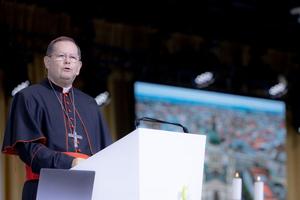Canada Celebrates John Paul II Day
Here in Canada, this April 2, we will be celebrating John Paul II Day. I don’t just mean the Catholic Church in Canada will be honoring him — I mean that the Canadian government has signed into law a bill declaring, “Throughout Canada, in each and every year, the second day of April is to be known as ‘Pope John Paul II Day.’”
The Ontario Legislature has also passed a similar bill. Both my provincial and my federal government have decided that we’re all going to celebrate the life and achievements of the recently canonized pope, who died 10 years ago on April 2.
The bill received overwhelming support in both legislatures — basically, the New Democrats were the only people who really voted against it, and even they were not united in opposition.
So what gives? Canada is supposed to be a pretty secular country, and we’re not usually known for our outspoken love of the Catholic Church. All parties functionally support abortion and “gay marriage.”
So why is Canada publicly honoring St. John Paul II with his own holiday?
To understand this, it may help to go all the way back to 2002, when John Paul II arrived in Toronto for World Youth Day. Let me tell you, Toronto was thrilled. Just tickled pink. I have never seen my city behave this way for anyone or anything.
Leading up to the event, there were the usual naysayers. Grumpy op-eds appeared in the Globe and Mail and the Toronto Star. The usual parade of complaints about condoms in Africa and women’s ordination got trotted out. And then the Pope arrived.
Suddenly, Star columnists who never have anything nice to say about the Catholic Church were gushing about how near they got to the popemobile. There were articles in our major, liberal, usually super-secular newspapers, in which various Canadian-Catholic worthies were given space to explain Church teaching without editorial asides explaining why they were wrong. The entire city, more or less, transformed into Vatican positive space overnight.
Then the Pope left, and we went back to being Toronto.
Yet the fact is: We loved him. We loved that he visited our country three times in the course of his pontificate (that fact is explicitly mentioned in the bill.) We loved that he seemed to stand for a Church that reflects a lot of core Canadian values.
They’re values that really have been reflected, not just by John Paul II, but also by Benedict XVI, Francis and various others, over the past 50 years: interfaith dialogue, international peace, equality, love for the poor and the marginalized, real commitment to human rights and courageous opposition to totalitarian systems.
If you look at the discussion surrounding parliament’s decision, it’s clear that Canada is celebrating John Paul II because we see him as an exemplar of these values.
He’s also being celebrated because Canadians take their multiculturalism very seriously. The impetus behind the bills, in both the federal and the Ontario legislatures, came from representatives of the Canadian-Polish community. By affirming John Paul II, Canada is also affirming Polish-Canadians and all Canadians who come from Soviet-bloc countries.
The fact that John Paul II was instrumental in helping to bring an end to communism in the Soviet Union is specifically mentioned in the text of the bill and has also been referenced in most of the supportive press that the bill has received.
Dipika Damerla, the politician responsible for introducing the bill to the Ontario Legislature, draws the connection quite explicitly:
“Being able to celebrate Pope John Paul II Day this year on April 2 will also provide us an extra opportunity to commemorate the 25th anniversary of the fall of communism in Central and Eastern Europe. John Paul II played an instrumental role in communism’s downfall, most notably in his native Poland, where, from the beginning of his pontificate and throughout the Solidarity years, his pious leadership helped provide Poles with hope, courage and resilience in the struggle against communist oppression.”
During the Soviet era, Canada received many refugees and immigrants from former Soviet-bloc countries. My husband’s family, for example, came to Canada fleeing the advance of Soviet troops into Lithuania at the end of World War II. For many Canadians with Eastern-European roots St. John Paul II is not just a religious figure, but also a major political hero.
Now, for a reality check: John Paul II Day is a nationally recognized holiday, but it’s not a legal holiday: Banks will still operate, grocery stores will have normal hours, and, probably, it won’t be celebrated in most public schools. After the initial outcry of the atheist pundits has died down, it’ll most likely only be celebrated by Catholics (who would have celebrated anyway) and by Eastern-European communities.
Still, when many Christians are afraid that religion is becoming increasingly marginalized by a world obsessed by tolerance, the fact that a nation known for its obsession with tolerance has chosen to recognize a religious leader in this way should be seen as good news.

















